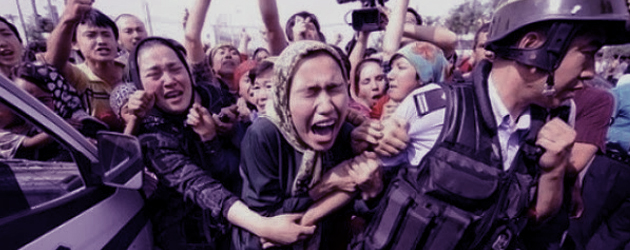STOP HUMAN RIGHTS VIOLATIONS AGAINST UIGHURS IN CHINA
5 February 2010
CALL ON THE CHINESE AUTHORITIES TO PROTECT AND RESPECT UIGHURS’ RIGHTS

The police crackdown on peaceful Uighur demonstrations in Urumqi in July 2009 echoed incidents from the past, including the violent repression of a Uighur protest in Gulja (Chinese: Yining) 13 years ago in February 1997.
During the intervening years, the Chinese authorities have failed to effectively address Uighurs’ long-standing grievances about discrimination and widespread violations of their economic, social, cultural, civil and political rights.
On 5 February 1997, dozens of people were killed or injured in Gulja in the Xinjiang Uighur Autonomous Region (XUAR) when security forces opened fire on ethnic Uighur protesters.
That day, Uighur residentsof Gulja began a peaceful demonstration. They were protesting against the closure of independent religious schools, the banning of “meshreps” (a traditional form of social gathering), the closure of a local Uighur football league and high rates of unemployment among Uighurs.
Security forces carried out house-to-house searches detaining suspected protesters and supporters. Many of those detained were reportedly tortured, some to death.
No independent investigation is known to have taken place into the allegations of serious human rights violations in Gulja.
Violence in 2009
Violence erupted again last year in Urumqi (Chinese: Wulumuqi) and other parts of the XUAR after police cracked down on initially peaceful Uighur demonstrations on 5 July.
In 2009, the demonstrators were protesting against initial inaction following the death of at least two Uighur workers after a violent riot at a factory in southern China (Shaoguan, Guangdong province) on 26 June.
The crackdown included house-to-house searches, widespread detentions and disappearances and was followed by violence on the part of both Uighurs and Han Chinese that lasted for several days.
Official government reports state that 197 people were killed, the majority of which were Han killed by Uighurs, and that more than 1,600 people were injured.
However, eyewitnesses interviewed by Amnesty International following the unrest contradict the official version of the events. They report witnessing security forces using excessive force against Uighur protesters including beatings, use of tear gas and shooting directly into crowds of protesters, resulting in the deaths of possibly hundreds more.
No independent investigation into the July 2009 violence has taken place to date.
Repression unchecked
Since July, the authorities have detained thousands of people, brought dozens to trial and threatened those involved in the unrest with harsh sentences. By the end of January 2010, 26 people had been sentenced to death in connection with the 2009 unrest and nine executed.
The region has witnessed hasty trials and executions, a lack of legal representation for those detained and the indiscriminate rounding up and detention without charge or trial of Uighurs, under the guise of destroying the ”three forces” of “separatism, terrorism and religious extremism”.
Chinese authorities have failed to recognize and adequately address the repression and discriminatory policies that fueled the unrest in Gulja in 1997 and Urumqi in 2009.
These include arbitrary detention, unfair trials, employment discrimination, and repression of religious freedoms and cultural rights.
They have interpreted all Uighur dissent as stemming from “terrorist” or “separatist” activities, justifying their harsh crackdown on Uighurs’ civil, political, economic, social and cultural rights.
The ongoing human rights violations experienced by Uighurs need to be urgently addressed in order to achieve the ‘social harmony’ that the Chinese government claims to seek. The ethnic identity of Uighurs is being systematically eroded. They are being discriminated against simply because of who they are.
READ MORE
Rebiya Kadeer’s personal account of Gulja after the massacre on 5 February 1997
Uighur ethnic identity under threat in China
Image caption: A Uighur woman protests before a group of paramilitary police in Urumqi, 7 July 2009. © ASSOCIATED PRESS/Ng Han Guan
Stop human rights violations against Uighurs in China | Amnesty International
ABOUT HUMAN RIGHTS IN EAST TURKISTAN Uyghur Foundation Stichting Oeigoeren Nederland Stichting Uighur Jurat Barat Stichting Uyghur Oost-Turkestan Uyghur Logo Nederlanders Holland Europe HUMAN RIGHTS Xinjiang Uyghur Autonomous Region


Leave a Reply